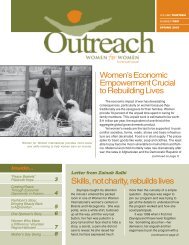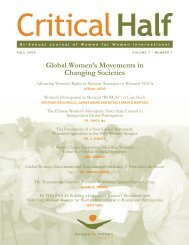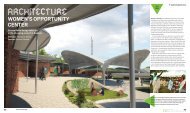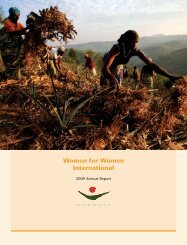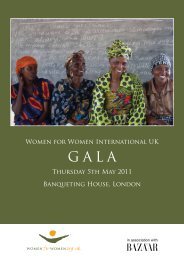Gender and Constitution Building - Women for Women International
Gender and Constitution Building - Women for Women International
Gender and Constitution Building - Women for Women International
You also want an ePaper? Increase the reach of your titles
YUMPU automatically turns print PDFs into web optimized ePapers that Google loves.
“Engendering” Rights in Ug<strong>and</strong>a:<br />
<strong>Women</strong>’s Struggle <strong>for</strong> Equality<br />
CARA DILTS<br />
Introduction<br />
Ug<strong>and</strong>a is often considered one of Africa’s modern<br />
successes in terms of national economic development<br />
strategies. In 1986, after years of war <strong>and</strong> political <strong>and</strong><br />
social turmoil, Ug<strong>and</strong>a began to pick up the pieces of its<br />
shattered nation <strong>and</strong> start down the path toward development.<br />
1 Although the northern areas of the country<br />
have had little rest from violent conflict over the last two<br />
decades, Ug<strong>and</strong>a has made admirable ef<strong>for</strong>ts to fight<br />
poverty <strong>and</strong> increase the st<strong>and</strong>ard of living <strong>for</strong> many of<br />
its nearly 25 million inhabitants. Ug<strong>and</strong>a’s star status as a<br />
leader in development <strong>and</strong> poverty reduction in Africa<br />
makes the country a valuable case study in an analysis of<br />
constitution-building in a post-conflict situation.<br />
This paper focuses on how Ug<strong>and</strong>a has addressed<br />
the gender issues that emerged in the post-conflict reconstruction<br />
era, specifically through re<strong>for</strong>ming the 1967<br />
<strong>Constitution</strong> to include equal rights <strong>for</strong> women. The paper<br />
then examines how Ug<strong>and</strong>an women’s constitutional<br />
rights often conflict with statutory law <strong>and</strong> customary<br />
practices, particularly in the area of property rights, emphasizing<br />
the discord between the letter of the law <strong>and</strong><br />
social practice.<br />
<strong>Women</strong>’s Rights in the New <strong>Constitution</strong><br />
One of the first tasks of Ug<strong>and</strong>a’s post-conflict reconstruction<br />
process was <strong>for</strong> the government to regain<br />
international legitimacy. In reinventing itself, Ug<strong>and</strong>a<br />
looked to international law, affirmatively recognizing international<br />
human rights st<strong>and</strong>ards <strong>and</strong> integrating these<br />
st<strong>and</strong>ards into the legal framework of the nation. As gender<br />
was gaining increasing legitimacy in the international<br />
arena as an essential component of development, 2 the<br />
Ug<strong>and</strong>an government followed suit by demonstrating a<br />
commitment to the advancement of women in its own<br />
domestic law.<br />
Since 1980, Ug<strong>and</strong>a has ratified a number of international<br />
laws <strong>and</strong> human rights instruments that proclaim<br />
gender equality, most significantly the 1985 Convention<br />
on the Elimination of All Forms of Discrimination<br />
Against <strong>Women</strong> (CEDAW). 3 In 1988, the government<br />
passed the <strong>Constitution</strong>al Commission Act, which provided<br />
guidelines <strong>for</strong> the drafting of the new <strong>Constitution</strong><br />
in 1995. 4 The revision of the Ug<strong>and</strong>an <strong>Constitution</strong> in<br />
1995 provided the perfect opportunity to bring about<br />
“equality of men <strong>and</strong> women in their national <strong>Constitution</strong>.”<br />
5<br />
As the national strategy <strong>for</strong> reconstruction began to<br />
take shape, women’s organizations across the country<br />
joined <strong>for</strong>ces to bring women’s rights to the <strong>for</strong>efront of<br />
the nation’s conscience <strong>and</strong> ensure that women would not<br />
be ignored. First, the National Association of <strong>Women</strong><br />
Organizations in Ug<strong>and</strong>a successfully lobbied <strong>for</strong> the appointment<br />
of two women to the <strong>Constitution</strong>al Commission.<br />
6 <strong>Women</strong>’s organizations such as the Forum <strong>for</strong><br />
<strong>Women</strong> in Democracy, Action <strong>for</strong> Development <strong>and</strong> the<br />
Ministry of <strong>Gender</strong> <strong>and</strong> Community Development, then<br />
backed the proposals of the women delegates <strong>and</strong> facilitated<br />
the involvement of women in the constitution-building<br />
process by holding “gender dialogues” <strong>and</strong> participating<br />
in workshops organized by the Commission.<br />
<strong>Women</strong> working on proposals <strong>for</strong> the new <strong>Constitution</strong><br />
referred to CEDAW’s concepts of equality to advocate<br />
<strong>for</strong> the inclusion of gender-equality measures in the<br />
<strong>Constitution</strong>. Today, CEDAW is reflected in a number of<br />
important provisions of the Ug<strong>and</strong>an <strong>Constitution</strong>. 7<br />
� Chapter Four of the <strong>Constitution</strong> addresses the<br />
protection <strong>and</strong> promotion of human rights <strong>and</strong><br />
freedoms, guaranteeing all Ug<strong>and</strong>ans, regardless of<br />
gender, such rights as freedom from deprivation of<br />
property, protection from slavery, due process,<br />
education <strong>and</strong> freedom from discrimination.<br />
� Article 32 instructs the state to undertake affirmative<br />
action to redress imbalances that exist against<br />
marginalized groups, including women.<br />
CRITICAL HALF 35



